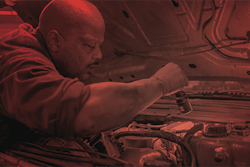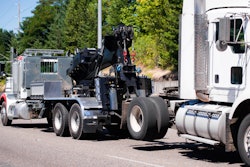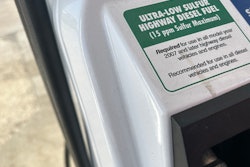
ROADCHECK IS LESS THAN 2 WEEKS AWAY.
If you missed CCJ's AMA with CVSA Inspection Specialist Jeremy Disbrow, click below to receive a recorded version. We received almost 300 questions and this 60 minutes could be a powerful tool in getting and keeping your trucks compliant.
CVSA's North American Roadcheck inspection spree is May 14-16. Inspectors will be on watch for various equipment and driver violations – like brake and tire wear issues, and hours of service – but tractor protection controls in the air system and alcohol and controlled substance possession will get special focus this year.
While Roadcheck is a three-day enforcement campaign, Commercial Vehicle Safety Alliance's (CVSA) Roadside Inspection Specialist Jeremy Disbrow emphasised there's really nothing unique about the inspections themselves.
"The inspectors are doing the same North American Standard Level 1 Inspection that they always do. It includes the same 37-step procedures, so there's nothing really different in there, and it's done in all jurisdictions," he said. "Really, the only difference is that this is an all-hands-on-deck campaign, and there's a lot of partnership with enforcement that's involved here, and industry, to again, promote outreach and educational opportunities. But really, the inspection process is the same.
CCJ, in partnership with Bestpass, hosted an one-hour webinar Wednesday, featuring Disbrow. Much of his 25 years of experience is focused on commercial motor vehicle safety, enforcement, outreach and training, and over the course of Wednesday's 60 minute webinar, Disbrow fielded nearly 300 questions submitted by members of the trucking community, and provided an instructional how-to on passing a commercial vehicle roadside inspection.
If you missed the webinar but still want the information, you can click here to sign up and have a recording of the event sent to you. You can also watch for future coverage from CCJ.
What are inspectors looking for with tractor protection controls?
The most important safety aspect to look at is to ensure that the wheels on the drive axle are chocked. And an inspector is going to do that, but if any drivers are trying to do this test on their own, it's really important to make sure the wheels are chocked to prevent any injury or any accidents. But after that, they're going to ask the driver to release the brakes on the vehicle. They're going to ask the driver to remove the gladhands on the trailer, and it's going to allow all the air to deplete. As that air depletes, it should stop losing air before it reaches 20 PSI, and that's really just to ensure that there's enough air pressure in there to safely have a brake application. They're going to ask the driver after that to step on the brake pedal and make sure that no air escapes out of those air lines.
And then after that, they're going to check on the trailer side for any bleed back or any loss of air coming out of the trailer side of the gladhands. I know that's a quick way to go through those steps, and if anybody missed it, they can go to our website at CVSA.org, and there's actually some handouts that explain that process and that procedure, if you want to go through it with your drivers.
How will inspectors conduct an inspection for controlled substance possession?
So inspectors are asked to do the same inspection that they always do, but they're just asking to have a heightened awareness, I guess, for what they're always looking for anyway, and that's indicators of impaired drivers. So they're going to be looking for signs and symptoms of impairment, just like they always do while they're talking to the driver. It's nothing different, they do that all the time, whether you realize it or not. While they're doing that, they're also looking for drugs and alcohol that are sitting there in plain view anywhere inside the cab. That's a great opportunity to see what's going on inside the truck. So it's more of a hypervigilance thing, but it's not really anything different, it's what they're always looking for.
But one thing I do want to point out, it's important to note that right now, a large portion of the focus is in the United States, on the Drug & Alcohol Clearinghouse. And in every inspection, inspectors are asked to query the Drug & Alcohol Clearinghouse and just make sure that drivers aren't prohibited in there. And we're also just reminding motor carriers to be checking their drivers periodically to make sure that there's no prohibitions and they're not putting somebody behind the wheel that they shouldn't be.
What are the legalities of drugs and alcohol in the cab?
Right now, marijuana is still a Schedule 1 substance, in the United States at least, and it's strictly prohibited in a commercial vehicle, and the use of it is prohibited as well, regardless of the state you're in and what their laws are. It's also important to know that even in states where marijuana is legal, drivers are still subject to a DOT drug test, and they still look for the same things, which include THC. So it's unfortunate, but I think a lot of drivers believe that it's legal in their state, so maybe on the weekend, they go out and use a little bit of marijuana, or they go to a party and use it thinking they're off duty and they'll sleep it off or whatever. But then they come back to work, they have a subsequent drug test for some reason, and they end up failing that test, which ultimately is going to end up costing them their CDL, they'll end up prohibited in the clearinghouse.
[Alcohol regulations] can vary between the U.S. and Canada, but let me hit the U.S. first. In the U.S., it's pretty clear-cut: alcohol is prohibited in any commercial vehicle while the driver's on duty, according to the federal regulations. This includes anywhere inside the vehicle, whether it's the cab or the trailer. The only exception to that really is if it's manifested as part of the load. The requirement applies to unopened and opened bottles of alcohol. So, as a rule of thumb, it doesn't belong in the vehicle anywhere. In Canada... the requirements can vary by each province, from what I'm being told and to the best of my knowledge. But I can tell you, even in Canada, it's definitely prohibited in every province that I'm aware of to be within the reach of the driver. But again, to play it safe, really, it's not wise to have it in the vehicle at all, especially when you're on duty.
What about prescription medication?
So a lot of people don't necessarily carry their medications in a prescription bottle. A lot of people use a weekly pill container, or whatever, to sort their medications, and that's fine. In general, you're welcome to carry your medications in a pill container. That being said, though, it's just important to remember that narcotics, amphetamines, certain Schedule 1 drugs and things like that are not allowed in a commercial vehicle. And certain habit-forming drugs can also potentially cause impairment, so those need to be accompanied by a letter from your doctor, or something that says it's not going to impair your ability to safely operate a commercial vehicle. That's one of the requirements. So if you're in doubt and you're not sure if it's one of those types of medications, I would definitely carry the prescription bottle just to show that it belongs to you. But if you're talking just general prescriptions, migraine medicine, things like that, you absolutely can keep those in other pill containers, and things like that.
Would a driver be put OOS if the inspector finds that no Clearinghouse query was made by the driver's current company?
Yes. So the regulations say that a driver can't operate a commercial vehicle if they're in a prohibited status in the Drug & Alcohol Clearinghouse, and that's regardless of whether the carrier checked their status or not, even if they're unaware of it. On the flip side, carriers are required to do that as well. So if a carrier's not checking them like they should be, that's something that would probably be handled in a subsequent investigation or something like that.
Are inspectors going to run a Clearinghouse query on all of the drivers inspected during the campaign?
Yeah, they're supposed to. That's one of the reasons we're raising awareness. It is a fairly new database out there, and inspectors have a lot of databases to check while they're doing this. So we're trying to raise awareness both for the inspectors and the industry side, and we are definitely asking them to do it every time.
Will inspectors be conducting drug and alcohol tests roadside?
No, that's not part of the initiative. As far as random testing or anything, no. They're just looking for signs of impairment, just like they would on any traffic stop: slurred speech... all the indicators that, whether you're in a car or a truck, they'd be looking for.
Need more answers?
Got questions about lights? Questions about tires? How about brakes? And drivers?
CCJ will have additional coverage leading up to Roadcheck, or you can sign up and receive the recorded version of the webinar, which covers all of these topics and much more.











